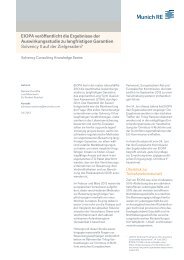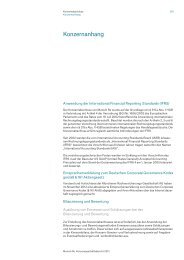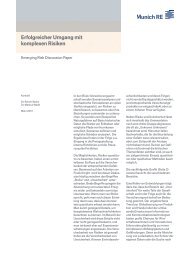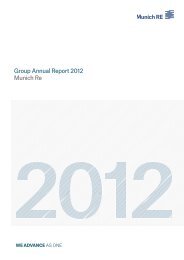Munich Re Group Annual Report 2006 (PDF, 1.8
Munich Re Group Annual Report 2006 (PDF, 1.8
Munich Re Group Annual Report 2006 (PDF, 1.8
You also want an ePaper? Increase the reach of your titles
YUMPU automatically turns print PDFs into web optimized ePapers that Google loves.
<strong>Munich</strong> <strong>Re</strong> <strong>Group</strong> <strong>Annual</strong> <strong>Re</strong>port <strong>2006</strong> Management report_Parameters<br />
credited with part of their ageing reserves. It is not yet possible<br />
to judge the effect the new regulations will have on<br />
the premiums paid by other insureds. This will be determined<br />
largely by client behaviour.<br />
Moreover, the introduction on 2 February 2007 of a<br />
three-year waiting period for switching to private insurance<br />
will have an impact on new business. Employees will<br />
only be exempt from compulsory insurance when they<br />
have exceeded the earnings ceiling for compulsory public<br />
health insurance – currently €47,700 – for three consecutive<br />
calendar years.<br />
The part of the Act relevant to private health insurance<br />
relevant is expected to come into force on 1 January 2009.<br />
It is anticipated that the German Insurance Mediation<br />
Act will enter into force on 1 April 2007 (this is the German<br />
Federal Government’s implementation of the EU directive<br />
on insurance mediation of 2002). The new Act will result in<br />
major changes for insurance marketing. In future, insurance<br />
agents will require authorisation under commercial<br />
law which will depend, among other things, upon their<br />
being sufficiently qualified. Insurance intermediaries operating<br />
exclusively on behalf of one or more insurance companies<br />
will require no authorisation if the relevant insurance<br />
products are not in competition with each other. In<br />
addition, insurance companies must accept unlimited<br />
liability for the actions of intermediaries in that capacity.<br />
Further key aspects of the new Act are the expanded consultancy<br />
and documentation obligations. Insurance agents<br />
are to advise clients according to their specific needs and<br />
circumstances, and give grounds for any specific policy<br />
recommendations made. Clients are to be provided with<br />
clear and comprehensible documentation for this purpose.<br />
Furthermore, insurance companies may work only with<br />
intermediaries who are entered in a central, publicly accessible<br />
register of insurance agents.<br />
The German General Equal Treatment Act has been in<br />
force since 18 August <strong>2006</strong> and is based partially on four<br />
EU discrimination-prevention directives adopted between<br />
2000 and 2004. It aims to prevent or eliminate unfair discrimination<br />
on grounds of race, ethnic origin, sex, religion,<br />
ideology, disability, age or sexual identity. The Act affects<br />
the insurance industry as an employer in particular, but<br />
also as an insurer and risk carrier. Employers have new<br />
obligations that can result in liability risks and potential<br />
claims for indemnity.<br />
The new provisions of the General Equal Treatment Act<br />
that are of importance for the insurance industry are valid<br />
from 22 December 2007. After that date, premiums and<br />
benefits for men and women may vary only when gender<br />
is a risk-determining factor and the risk evaluation is based<br />
on relevant and exact actuarial statistical data. Under no<br />
circumstances are costs connected with pregnancy and<br />
maternity to lead to variations in premiums or benefits.<br />
Differences in insurance companies’ handling of individuals<br />
on the basis of religion, ideology, disability, age or<br />
sexual identity are only admissible when founded on<br />
recognised principles for calculating prices commensurate<br />
with risk.<br />
The European Commission’s Solvency II project will<br />
have the greatest effect on the insurance industry. This is<br />
scheduled to involve a comprehensive reorganisation of<br />
insurance supervisory law within the EU, taking a riskbased<br />
approach, one of the core ideas of which is to consider<br />
individual risk exposure. Preparations for this are<br />
increasingly picking up steam. The Commission plans to<br />
publish a draft framework directive in July 2007.<br />
In the USA, there have been discussions for quite<br />
some time on the introduction of an integrated federal<br />
supervisory authority for reinsurance companies. At present,<br />
the insurance industry is supervised by 50 insurance<br />
commissioners in the individual US federal states. There is<br />
now virtual unanimity that this system is inefficient and<br />
costly, weakening the competitiveness of the US market<br />
overall. In <strong>2006</strong>, bills to revise the supervision of primary<br />
insurers and reinsurers were introduced in both the Senate<br />
and the House of <strong>Re</strong>presentatives. Each of these bills<br />
envisages federal supervision for insurance companies.<br />
For international reinsurers in particular, this would have<br />
the advantage that legally binding international agreements<br />
on the supervision of insurance companies could<br />
be concluded.<br />
65

















